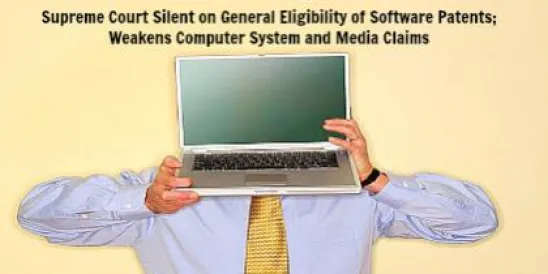Today, the U.S. Supreme Court upheld previous decisions finding that certain business method patents are not capable of patent protection under 35 U.S.C. § 101 because they are unpatentable “abstract ideas.” ALICE CORPORATION PTY. LTD. V. CLS BANK INTERNATIONAL ET AL., No. 13–298. Although many anticipated that the decision would provide clarity regarding the definition of an “abstract idea,” and whether business methods were patentable, little guidance was provided.
However, the decision likely clarifies the status of computer system and media claims mirroring method claims directed to “abstract ideas”. The Supreme Court suggested that such computer system and media claims are ineligible under §101 unless they add to the substance of the underlying “abstract idea.” Also important is what the Court did not decide. Contrary to the fears of some, the Court did not undermine the general patentability of software patents.
Justice Clarence Thomas delivered the opinion for a unanimous Court. As noted by the Court, subject matter eligibility under §101 has long included “an important implicit exception: laws of nature, natural phenomena, and abstract ideas are not patentable.” Viewing Alice’s claims in light of the risk hedging claims invalidated by the Court in Bilski, the Court found that “there is no meaningful distinction between the concept of risk hedging in Bilski and the concept of intermediated settlement at issue here. Both are squarely within the realm of 'abstract ideas' as we have used that term.”
However, the Court also elected to not define an “abstract idea.” Significantly, the Court appears to have resolved an open question that had divided the Federal Circuit below regarding the fate of computer system and media claims associated with method claims that are directed to “abstract ideas.” The Opinion noted, “Put another way, the system claims are no different from the method claims in substance. The method claims recite the abstract idea implemented on a generic computer; the system claims recite a handful of generic computer components configured to implement the same idea… Because petitioner’s system and media claims add nothing of substance to the underlying abstract idea, we hold that they too are patent ineligible under §101.” Although the Court did not explicitly announce this as a new rule, it appears that the same analysis may be applicable to any patent with computer system and computer media claims that track to similar computer-implemented method claims.
Patent prosecutors should note that the decision makes system and media claims more vulnerable. If an application or patent has method steps that are potentially directed towards “abstract ideas,” system and media claims will provide little or no additional protection. Therefore we encourage the following in preparing and prosecuting computer-implemented patents: First, although claim breadth is important, ensure that any allowable method claims have meaningful limitations, particularly in business method contexts. After this decision, it is likely that an overly broad claim may invite attacks. Second, consider strategically adjusting system and media claims. Although not every system claim may require special purpose computer hardware, identifying multiple parties or structures in such claims may assist in distinguishing the system and media claims from the method claims.
Further, the decision provides very powerful assistance for petitioners in Covered Business Method Review proceedings. The PTAB’s CBM proceedings have already struck several patents down as invalid under §101. The Supreme Court’s affirmation today will make it easier for petitioners to successfully challenge business method patents.





 />i
/>i

